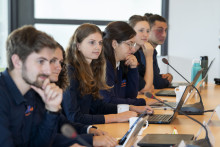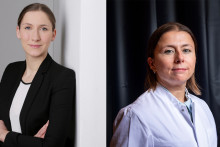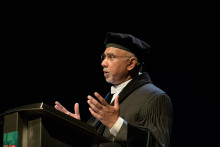Almost all of the votes in yesterday’s general election have now been counted. Geert Wilders’ far right PVV party stands head and shoulders above the rest, a result that could have major implications for higher education and scientific research.
One thing is certain: migration will be a major issue in the upcoming negotiations to form a new coalition government. A strong majority in the House of Representatives backs moves to limit the number of students entering higher education from abroad.
PVV, NSC and VVD alone have 81 out of the 150 parliamentary seats available. These parties want Bachelor’s programmes to be taught in Dutch, although VVD still wants an exception for universities of technology.
They believe this will drastically reduce enrolment by foreign students who do not speak the language. With support from BBB, CDA and one or two other parties, these plans should also sail through the Senate, even though Pieter Omtzigt’s new NSC party has yet to establish a presence there.
Senate
Thirty-six of the Senate’s 75 seats are already in the hands of parties who back the measure: BBB (16), VVD (10), CDA (6) and PVV (4). For a majority, they need two more votes, which could well come from SGP or Forum for Democracy. On this issue, even SP and PvdD (three Senate seats each) could vote with the right-wing block. Although from the other end of the political spectrum, they are also keen to promote Dutch as a language of higher education.
How easy is it to switch all Bachelor’s programmes to Dutch? It’s not a change that will happen overnight. ‘You have to take it one step at a time’, Omtzigt said in the election campaign, ‘because some of the current teaching staff are native English-speakers. So I can’t foresee doing that in one year. A reform of this kind takes three to four years to implement.’
Even that would be lightning quick. Coalition negotiations could go on for months. After that, the new education minister will have to come up with their own bill, which then has to go through the House and the Senate.
All told, it will not come into force until the 2025/2026 academic year, and probably not until the year after. And that would only take us to the start of the transition period. There are no guarantees that a new government will even last that long.
Protest
There is another hurdle to consider: the universities in particular are likely to dig their heels in. With protests, lobbying and perhaps even court cases, they will try to maintain their international position. The same will be true for some universities of applied sciences with many foreign students and teachers.
It is also unclear how radically the parties intend to change course, now that it’s time to take action. Should every single Bachelor’s programme go back to being taught in Dutch? Omtzigt, for example, once suggested exempting ‘a maximum of 20 percent of courses’.
And what form would any exemptions take? Can hotel schools and art colleges continue as they are? Will university colleges continue to exist? Can a Bachelor’s programme like international business still hold its own? There’s every chance that a committee will have to be formed to figure all this out in consultation with the higher education sector itself. Another process that is likely to take at least a year.
Tougher action
But perhaps the new governing parties will want to take tougher action. In that case they could cut the 400 million euros set aside for Bachelor’s programmes in anticipation of agreements on internationalisation and the language of instruction. That amount emerged from the pre-election analyses conducted by the Netherlands Bureau for Economic Policy Analysis (CPB). It is a grim prospect for many a university, and it will lead to problems for universities of applied sciences too.
Investment in higher education and research will come under pressure regardless, despite NSC’s election pledge to reserve a ‘substantial budget for fundamental scientific research and knowledge transfer’. The VVD’s manifesto proposed cutting the education budget by 1.3 billion euros.
Cuts aside, how will the scientific research budget be distributed now that the country has taken a turn to the right? There’s a good chance that economic benefits and social utility will come to the fore again. Right-wing parties have a preference for science and technology, though they may have some additional cash to spare for national history and Dutch Studies. Either way, there is likely to be less scope for free research.
Unless…
Unless, that is, the negotiations to form a new government go nowhere and the Netherlands has to go to the polls again. In that case, all bets are off. And if a new government does emerge, with or without Geert Wilders as prime minister, the question is how stable it will be. In the end, perhaps it will have too little time for major interventions in higher education.






